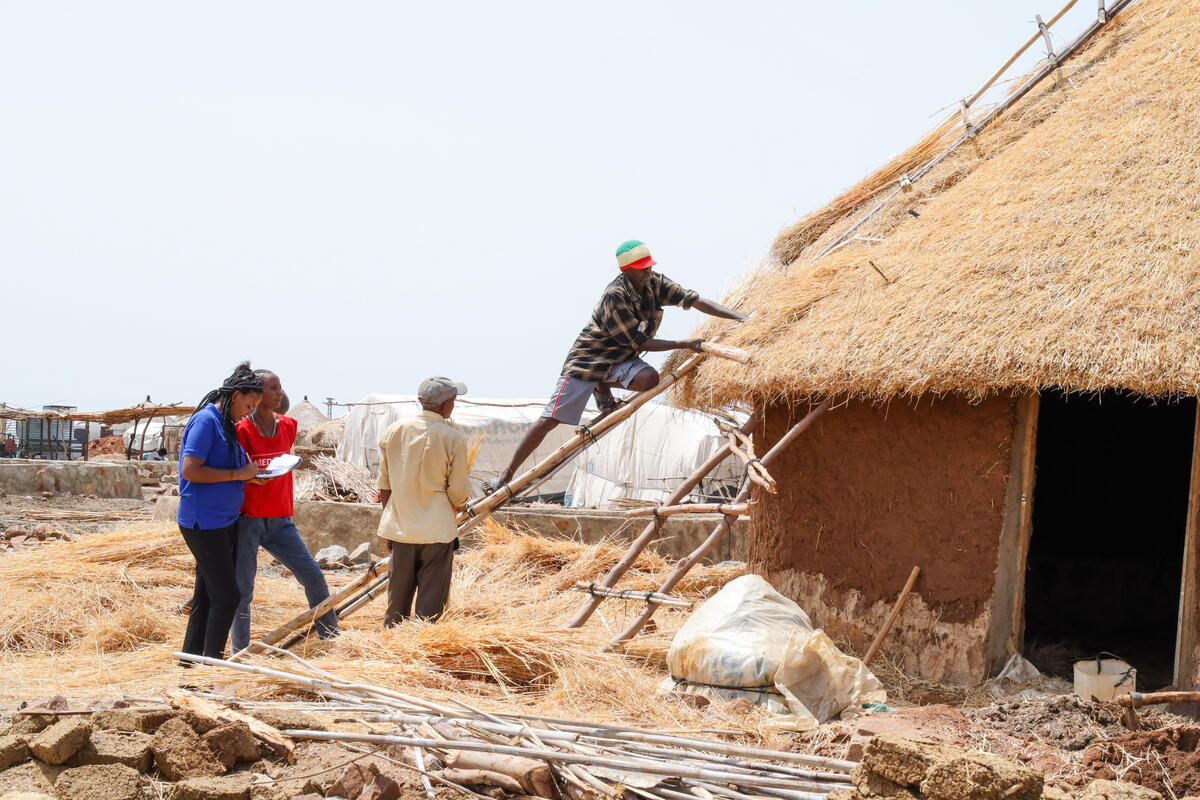16 Days of Activism: South African border shelter helps young Zimbabwean women
16 Days of Activism: South African border shelter helps young Zimbabwean women

MUSINA, South Africa, December 1 (UNHCR) - Thousands of young women like Breyen and Emily flee persecution and poverty in their native Zimbabwe in the hope of finding safety, shelter and employment in neighbouring South Africa. The reality for many is more a case of out of the frying pan and into the fire.
For help in crossing the border into north-eastern South Africa, the 22-year-old cousins turned to smugglers they saw as good samaritans, but who turned out be criminals preying on young women seeking a better life outside Zimbabwe. The girls only admitted to losing their money and suffering from trauma; others, including married mothers, have been beaten, robbed, raped and even killed by their escorts or the magumaguma, scavenger gangs on the South African side.
Breyen and Emily had hoped to go to Johannesburg and, once across the porous border, they were left at a taxi rank in the town of Musina, where the UN refugee agency provides support to South Africa's Department of Home Affairs at a Refugee Reception Office opened in July to process asylum requests.
But the girls had no money left to get them to the metropolis and nowhere to stay in Musina, which lies some 15 kilometres from the Beit Bridge border crossing point between Zimbabwe and South Africa.
Their luck was in when a sympathetic petrol station attendant directed them to the Matsaung Shelter for Women, which is run by the Uniting Reformed Church of South Africa and receives financial support from the UN refugee agency. Here, women receive shelter, food and medical care until they are given an asylum seeker permit from the Musina Refugee Reception Office.
The shelter, which opened on September 1, can accommodate about 100 women and 25 infants at any one time. Priority is given to victims of sexual and gender-based violence (SGBV) and they stay anywhere from five days to a fortnight while awaiting the permit, which allows them to stay in South Africa as well as work and study while their application for refugee status is being determined.
Eugenia Matsaung, who runs the shelter with her pastor husband, said they decided to set up the facility when Zimbabwe's dire political and economic situation further deteriorated after national elections in March this year.
"The number of young women and children we encountered on the streets and in seedy corners of Musina concerned us greatly," recalled Eugenia. "As [representatives of] the Uniting Reformed Church, we were burdened with what to do to help them."
For UNHCR, the Matsaung centre plays a vital shelter and protection role. "The lack of proper shelter to accommodate asylum seekers [in Musina] is a serious concern," said Monique Ekoko, UNHCR's senior regional protection officer. "For the most part, women and children must bed down in bushes and other high-risk places."
The refugee agency helped find premises for the shelter and paid for renovation costs. It now provides funding for food and for electricity and water. It also arranges counselling for those who need it. A visit to the shelter shows that many are traumatized; they respond to questions in monosyllables, or not at all.
UNHCR's Ekoko helped explain why they are in such bad shape. "For the most part, women taking refuge at the shelter are victims of sexual and gender-based violence," she said. "Our preference is to take in women who've suffered that indignity [SGBV]," added Matsaung.
The UN refugee agency is firmly committed to the struggle against SGBV, UNHCR offices around the world are supporting the annual 16 Days of Activism to Eliminate Violence Against Women, which began on Tuesday and ends on International Human Rights Day (December 10).
But the Matsaung Women's Shelter is not enough at a time when a growing number of foreigners, mostly Zimbabweans but also Africans from the rest of the continent, are turning up in Musina and applying for the asylum seeker permits which will allow them to continue their journey to places like Johannesburg.
Clearly more needs to be done and UNHCR is considering a proposal to support the building of another shelter, according to Ekoko. "A decision on this will be taken shortly," she said.
Meanwhile, Breyen and Emily have received their permits and are planning their next move. "We will look for short-term employment to make money to buy train tickets to Cape Town, where a relative is waiting for us," said Breyen. "This time we will be careful whom we ask for help and pray that our journey will be less traumatic than it was when we arrived in Musina."
By Pumla Rulashe in Musina, South Africa








